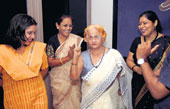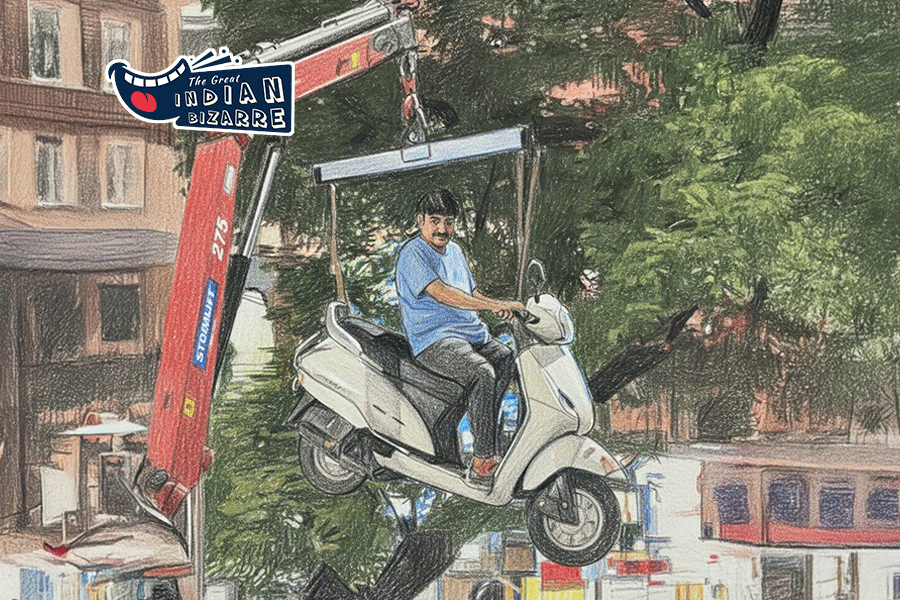 |
| From left: Mirakkel contestants Rituparna, Shikha Chatterjee, Anima and Swati De. Picture by Bishwarup Dutta |
Women can be funny too. Men, it seems, make up the greater part of an audience — though Mirakkel on Zee Bangla claims there are men, women and children rooting for it — and humour is a symptom of intelligence. And too much of “intelligence” in women, still, can be “threatening” to men. So, in some way, men do not want women to be funny. At least that’s what Christopher Hitchens writes in Vanity Fair in a recent article called ‘Why Women Aren’t Funny’.
The writer, who has made a career out of going after landmarks of the contemporary world, including Mother Teresa, adds another reason. Filth, he says. “That’s what the customers want, as we occasional stand-up performers all know. Filth, and plenty of it. Filth in lavish, heaping quantities,” says Hitchens. Gross stuff about the body. Plus men tend to think of life as a bitch, while women are its nurturers. So men will crack the jokes, while women will laugh.
It’s debatable where Hitchens is more wrong — to think that men like filth more than women or that they see life as a bitch while women don’t. But he would be pleasantly surprised if he visited Calcutta and watched Mirakkel Akkel Challenger Show, the stand-up comedy show on Zee Bangla that’s a TRP-raker for the channel. The women can hardly be missed on the show — not only as audience, but also as participants.
 |
| Mir |
Some of the women on the show are — at least are trying to be — as good as the men can get. With a programme like Mirakkel, they are making inroads into the brave world of stand-up comedy. Out of 30 participants this year at Mirakkel, nine were women. Last year, there were two women among 25. The year before, the show’s first year, there were four women among 16 contestants.
The women crack jokes, some of which are off-colour, as confidently as the men. This is not to say that women’s liberty lies in speaking dirty — far from it. But it is heartening to see that women can take the same liberties with language as men. The face of comedy in India, which for long years was that of Tuntun or Guddi Maruti — women were either women, or funny — is changing. Humour is liberating. Or is it?
‘Non-veg’ taboo
There are teething problems. A huge percentage of jokes tend to be sexist. Even on Mirakkel, it’s not unusual to find a cute boy — there are several children on the show — “imitating” a mother or an aunt as a symbol of universal stupidity. But women don’t mind it so much, it seems. Mousumi Mitra, a contestant, went ahead with something like: “A man is incomplete before marriage and he is finished after marriage.”
What really divides the men from the women is the discomfort about the “fair sex” (a description used by Hitchens, too) joking about “non-veg” subjects, Indian for scatology, sex and everything that shouldn’t be spoken about in front of children, at least in person. “There is a sense of taboo about women comedians. But I think it is going away,” says Mir, the popular host of Mirakkel, who on a good day can induce real belly-laughs. But the taboo is taking its time to depart.
 |
| Shazia Mirza |
Rituparna Chatterjee is a contender on Mirakkel, and a good one that. She is uninhibited. But she faces hurdles. “A man can get away with any joke they crack. The reaction to a joke with a sexual connotation from a woman is very different,” says Rituparna. “I had submitted one about a father receiving a telegram saying ‘Your daughter has not succeeded in B.Ed’. He commits suicide because the dot between the B and the Ed was missing. I was told that this would not do… tomar mukhey manabey na (it won’t suit you).” A man told the same joke and he got brownie points for it. One other joke she cracked was edited. Several risque jokes from women are rejected during grooming sessions. What is fun for men is cheap in women.
“Women are asked not to tell such jokes as the responsibility to keep things decent seems to be with the women,” says Rajashri Dutta, finalist in the first year of the show. No woman has won the show either — or got an after-life. “Male contestants are offered roles in serials but I have not seen any of the women in the Bengali serials,” adds Rituparna.
Not that there is an Ellen DeGeneres — or a Sabitri Chattopadhyay among them. But that hasn’t stopped them. “A major chunk of applications is from women,” says Raj Chakraborty, director of Mirakkel, which started a year ago. Why the applications are rejected is not explained. As actress Indrani Haldar, a judge on the show, says: “Male performers can say many things that a woman cannot. But women are picking up the art.”
Hush, she said it!
But it’s nice to watch someone like Rituparna. The chubby 24-year-old MBA student doesn’t look like a “comedian” at all. She is not afraid of coming on television and saying naughty things or being labelled cheap. “One joke was appreciated,” she says. It goes: Two children were at a hospital. One was crying continuously. The other asked why he was crying. The first child said: “I have come for a blood test and they will cut my finger to do that.” Hearing this the second child started crying very badly, saying: “I have come for an urine test.” Everyone on the set winced, there was a small collective gulp. It was a kind of coming out.
“When a woman in the ongoing season of Mirakkel cracked a risque joke, I sensed a silence not only among the judges, but among the men in my family too,” says 64-year-old Pronoti Dutta Majumdar, an avid watcher of Mirakkel. But with Rituparna, everyone laughed hard, too.
Age no bar
How many of you can tell the difference between Titagarh Paper Mills and Writers’ Buildings? Mousumi Mitra, the 37-year-old sari-clad teacher, has a candid reply: “Prothomta te baansh dhuke paper hoye beroy ar dwitiyota te paper dhoke aar baansh hoye beroye (the first one transforms bamboo into paper and the second turns paper into bamboo. Bamboo in Bengali, baansh, is a crude expression for spoiling someone’s trip.)
“I never felt any pressure while performing in front of the camera,” says Shikha Chatterjee, another participant. Perhaps Puja “para functions” will feature women comedians this year.
Anima Basu stands out. She is 76. She is a huge hit with her Oriya song, performed to smart steps, much admired by the crew of Mirakkel. “You cannot make someone laugh if you can’t laugh yourself. This is an art and I know I can do that,” she says with a mischievous smile. She seemed to be an inspiration for the younger participants in the group. Give her any topic and she will crack it. Naughtily. With a wicked gleam in her eyes. Thakumas going this way too!
The judges claim absolute gender-sensitivity. “It is the performance and not the gender that matters to me,” says actor Rajatabha Dutta. The way a woman looks also doesn’t matter at all, they say. “There was a time when people laughed at the physical structure of a female comedian, but now most of the people laugh at the wit,” says Mir. (Though Mousumi, who has been part of group theatre for 20 years, keeps feeling that she has to “restrain” herself a bit, for as a woman she cannot use certain words.)
But regions seem ahead of the national scene with their favourable gender-ratio. To its nine women, The Great Indian Laughter Challenge on STAR One has only one woman, as Mir points out.
And on the international level there is someone like Shazia Mirza. A UK-based Muslim of South-Asian origin, she made her name after the 9/11 attacks by beginning her act — wearing a hijb — with the deadpan remark: “My name is Shazia Mirza. At least, that’s what it says on my pilot’s licence.” That was really risky.
Way to go, girls!











